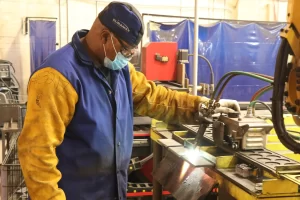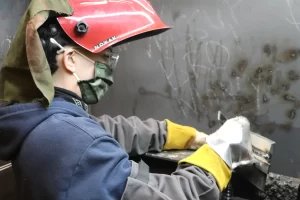Personal safety during a welding career is a must. Every choice you make as a welder should be governed by the safety regulations established by organizations like the OSHA (Occupational Safety and Health Administration) and the American National Standards Institute (ANSI). A long and prosperous welding career relies on the education you obtain from welding trade school.
When safety precautions are not observed, welding can be a risky profession. Welders may encounter dangers such as exposure to toxic vapors and glasses, electric shock, fire and explosions, and more if safety precautions are disregarded. Would it be permissible for a doctor to perform a delicate surgery without gloves or for a firefighter to avoid wearing a helmet? Of course not! The same rules apply to welders, who must adhere to them to safeguard themselves and those around them.
Welders must exercise safety by doing the following since welding has numerous potential risks. examining the environment
Even though accidents occur, many injuries can be prevented by knowing what to do not to do when working in a welding training set. Welders must take the time to make sure they understand how to complete the task safely before beginning any assignment. The most crucial action individuals can take to safeguard both themselves and the people around them is this.
Welders confront many potential risks at work, as previously discussed, so jobs in welding safety are crucial. Among the most typical are:
A sudden electric shock to the body can result in life-threatening damage and occasionally even death. When a welder contacts two metal objects that are electrically charged and puts them in the circuit, it may result in electrocution. The risk to the welder increases with voltage since higher voltage results in increased current.

Several potentially dangerous metals, such as aluminum, beryllium, arsenic, manganese, and lead, are present in welding fumes. During welding work, nitrogen, carbon dioxide, argon, carbon monoxide, and hydrogen fluoride are among the other gasses that are frequently created. Overexposure to these fumes and gasses can cause significant health issues in welders, including decreased speech and mobility, respiratory illnesses, and even cancer.
Welders may sustain many physical injuries without the appropriate PPE (personal protective equipment), such as eye damage, wounds, burns, or even crushed fingers and toes. Since these wounds may occasionally prevent a welder from working, they should be addressed seriously.
If safety protocols are not followed, a welding course can produce extremely high temperatures, posing a fire and explosion risk. The most frequent reason for fire, despite the arc itself reaching temperatures of up to 10,000 degrees Fahrenheit, is when sparks and splatter come into contact with combustible substances nearby the work area.
By giving the workspace appropriate ventilation, exposure to fumes and gasses can be reduced. A fan, an exhaust system, or exhaust hoods may be provided by some workplaces to let welders operate in an environment free of fumes and gases. Welders should use respirators when necessary to prevent themselves from inhaling dangerous pollutants. Inform a supervisor right away if you ever feel as though your breathing is being restricted.
One of the most crucial areas of electric shock education for welders is that it can present an immediate and severe risk. Welders must always check the electrode holder for damage before beginning their weld to prevent electrocution. They must also keep dry insulation between their body and the ground or the metal being welded, ensure their gloves are dry and in excellent condition, and never touch the metal components of the electrode holder with wet skin or clothes.

Before using their equipment, a professional welder always double-checks to ensure it is grounded and in good working order. Even the most skilled welders should routinely inspect their tools for signs of normal wear and tear, such as frayed wires or leaky hoses, as these might raise the possibility of an accident. Don’t assume that a piece of equipment is still in the same condition just because it worked flawlessly yesterday. You should always thoroughly inspect anything before using it again.
A congested workbench is one of the most frequent reasons for welding flames and explosions. Keep your workplace free, especially of flammable goods, since sparks from the welding arc can fly up to 35 feet away.
Without taking the proper safety measures, welding program is a physically demanding profession that can result in injury. Always use safe lifting techniques, take breaks during the day to stretch, and make sure to give your body time to recover. Some welders are susceptible to repetitive stress injuries, which may help prevent them.
Holding yourself and other people accountable for adhering to safety regulations is vital for welders. Reporting safety violations is helpful for both you and the people with whom you share a workspace. Also, don’t be scared to speak out if you feel unsafe in your workplace.
Read More